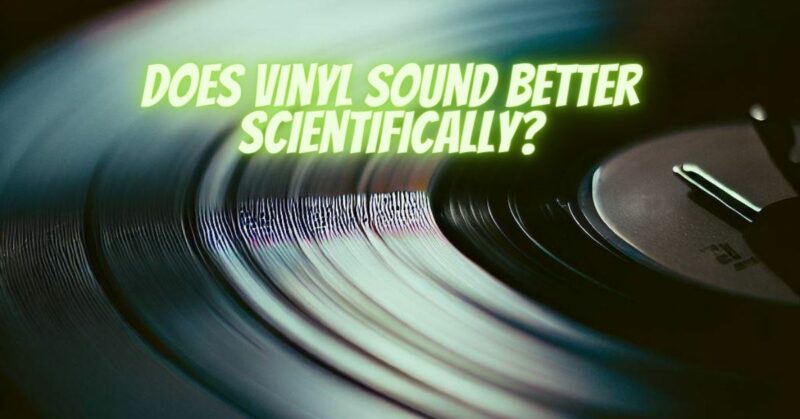In the age of digital music dominance, vinyl records have experienced a resurgence in popularity, often hailed for their warm and nostalgic sound. The ongoing debate over whether vinyl truly sounds better than digital formats like CDs or streaming has piqued the curiosity of music enthusiasts and audiophiles alike. In this article, we’ll delve into the scientific aspects behind the vinyl sound, exploring the factors that contribute to its unique character and addressing the question of whether vinyl truly sounds better from a scientific standpoint.
The Vinyl Charm:
1. Analog vs. Digital: Vinyl records offer an analog listening experience, with sound waves physically etched onto the grooves of the record. This contrasts with digital formats that rely on sampling and encoding.
2. Warmth and Character: Many listeners perceive vinyl’s sound as warm, characterized by subtle distortions and imperfections that contribute to a more organic and atmospheric feel.
Scientific Considerations:
1. Frequency Response: Vinyl records have limitations in reproducing high-frequency sounds compared to digital formats, which can result in smoother and less harsh audio.
2. Dynamic Range: Vinyl records have a narrower dynamic range than digital formats, potentially impacting the ability to accurately reproduce very quiet and very loud passages.
3. Surface Noise: Vinyl records are susceptible to surface noise caused by dust, scratches, and imperfections. This noise can impact the overall listening experience.
4. Mastering and Production: The quality of vinyl sound heavily depends on the mastering and production process, including factors like mastering engineers’ decisions and the pressing quality.
Pros and Cons:
Pros of Vinyl Sound:
1. Warmth and Character: Vinyl’s unique distortions and imperfections contribute to a warm and nostalgic sound that some listeners prefer.
2. Tangibility: The tactile experience of handling vinyl records adds to the overall appreciation of the music.
Cons of Vinyl Sound:
1. Limitations: Vinyl records have inherent limitations in frequency response and dynamic range, which can impact audio accuracy.
2. Surface Noise: Surface noise can detract from the listening experience and degrade audio quality.
Scientific Verdict:
While vinyl records offer a distinctive and often cherished sonic experience, the question of whether they scientifically sound better is not straightforward. The “better” quality is subjective and varies from person to person. Vinyl’s warmth and character appeal to those seeking a unique sound, but it’s important to recognize that vinyl has limitations and challenges that digital formats overcome. Factors such as personal preference, equipment quality, mastering decisions, and even nostalgia contribute to the perceived quality of vinyl sound.
The debate over whether vinyl sounds better scientifically is complex and multifaceted. Vinyl’s warmth and character come with inherent limitations and challenges that digital formats have managed to overcome. Ultimately, whether vinyl sounds better depends on individual preferences, the listening environment, and the equipment being used. The revival of vinyl has added a layer of musical diversity to the modern landscape, allowing enthusiasts to appreciate music in different ways. Whether you choose vinyl, digital, or a combination of both, the richness of music can be enjoyed in a multitude of formats, each with its unique attributes.


